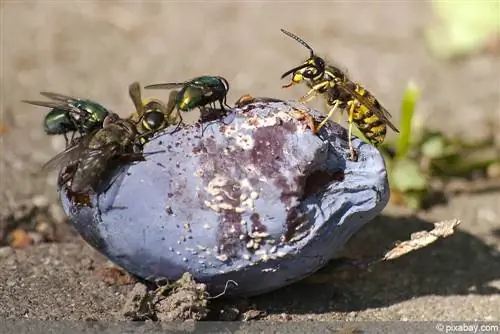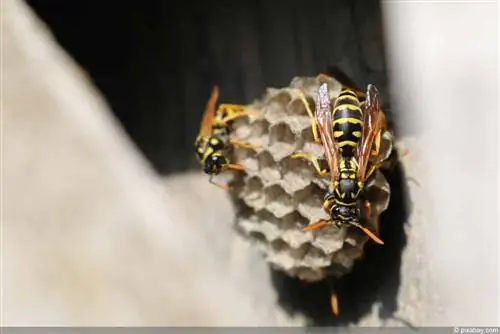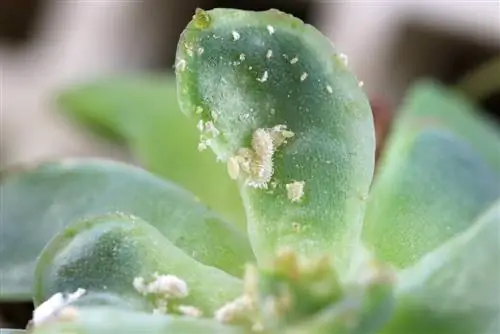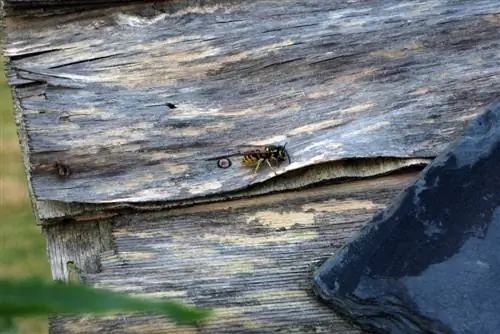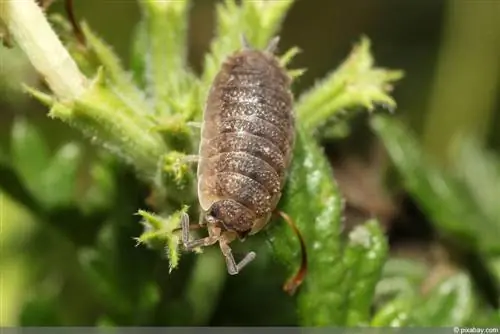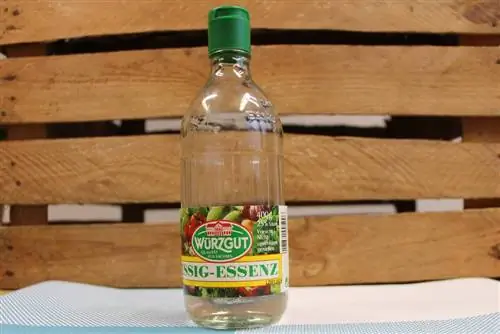- Author admin caroline@plants-knowledge.com.
- Public 2023-12-17 03:39.
- Last modified 2025-06-01 06:48.
As soon as the summer coffee table is set or the grill is set up, wasps are there. The yellow and black pests enthusiastically devote themselves to the delicacies on the table. Because their stings are so painful and even life-threatening for allergy sufferers, the insects spread fear and terror. This forces even the most nature-loving home gardener to forcefully ban uninvited guests from the garden without causing them any harm. This guide has put together the most effective wasp defense strategies for you.
5 home remedies
- which lets you eat in peace in the open air -
Sweet distractions
Until August and September we only notice a few wasps swarming around flowers in the garden looking for nectar for the offspring in the nest. In late summer, the busy workers become unemployed because drones and young queens have left kindergarten. Now the infestation pressure in the garden is increasing explosively because the entire colony is looking for tasty food every day, which does not necessarily have to consist of nectar and pollen. Sweet and spicy dishes are very popular. Lemonades and beer are also not disdained. By using the wasps' greed for the following diversionary maneuvers, your coffee table and barbecue area will be spared from the buzzing nuisances. This is how it works:
- Halve overripe grapes
- Place on a plate with the cut side up
- Alternatively, dissolve glucose in water
- Offer food dough made from 20 grams of honey, 30 milliliters of water and 100 grams of powdered sugar
Place the bowl at a distance of about 10 meters from your set table. Instead of grapes, you can use other fruits. As has been found in field tests, you achieve the best distraction effect with cut grapes. Ideally, you should start the measure about a week before the planned coffee party or barbecue party. By then, the wasps will have gotten used to your new feeding place and will fly to it without bothering you and your guests at the table.
Tip:
Undiluted honey and pure jam are unsuitable as home remedies for repelling wasps in the garden. The exorbitantly high sugar content has a high potential for aggression for the hungry insects.
Studde lemon slices with cloves
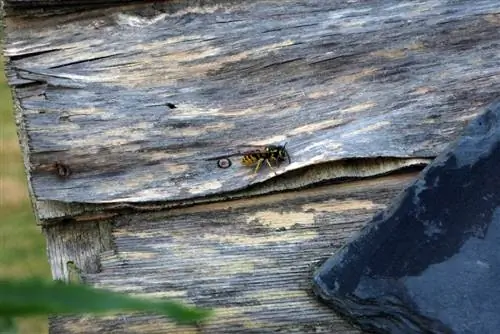
Are you looking for a home remedy for repelling wasps that will allow you to eat with peace of mind and at the same time contribute to the table decoration? Then trust the scent combination of cloves and lemon. Slice one or more lemons and insert cloves into them. Both smells combine to create an invisible barrier around your table. As practical experience in the garden has shown, you won't achieve any significant repelling effect on wasps with a single peppered lemon slice. From a density of 3 to 5 pieces per square meter of table surface, the pests will avoid you and your guests.
Smoldering Coffee Beans
The ecologically oriented home gardener has long been familiar with coffee powder as a non-toxic control against snails and fertilizers. Coffee beans have also emerged as a home remedy for effective wasp defense in the garden. Wasps can't stand what we smell as a seductive scent. Therefore, fill a fireproof bowl with coffee beans and light them. Alternatively, place the fragrant beans on the smoldering grill. It's easier with coffee powder, as the finely ground grains ignite more quickly. Arrange the bowls with the smoldering coffee around your table, wasps will run away and you can eat with peace of mind.
Lighting incense
Frankincense aims in a similar direction to smoking coffee beans for repelling wasps in the garden with home remedies. This method has the advantage that you don't necessarily have to light incense branches in order to eat in peace. The plant is also available as an essential oil. Warmed in a decorative aroma lamp, incense exudes a pleasant aroma for the human nose. However, the scent has a repellent effect on the sensitive sense of smell of annoying wasps. As a sole home remedy for repelling wasps, frankincense does not have any significant effect. In combination with distraction feeding and peppered lemon slices, this method has proven to be successful in practice.
Put citronella floating candles on the table
When mosquito-plagued gardeners relied on the effect of citronella-scented candles, an interesting side effect emerged. It wasn't just mosquitoes that stayed away from the seating area in the garden. Wasps also avoided the set table. Since then, the popular candles with the lemony scent have made it into the rankings of effective defense methods against wasps. As a floating candle or in a pretty terracotta bowl, the repellent also functions as a table decoration. After all, you can be confident that the nuisance caused by wasps will be significantly reduced. If you put together a complete package from the 5 home remedies mentioned here, you have the best prospects of spending peaceful hours in the garden without intrusive wasps.
Tip:
Remain calm if a wasp approaches you. Only when people hit wasps in panic and wave their arms can painful conflicts arise. A wasp only stings when it sees no other way out.
Preventive measures
The effectiveness of these 5 home remedies is significantly increased if you take measures in advance to combat the approaching swarm of wasps. The following precautions make a lasting contribution to carefree dining in the summer garden:
Planting nectar-rich flowers in the hinterland
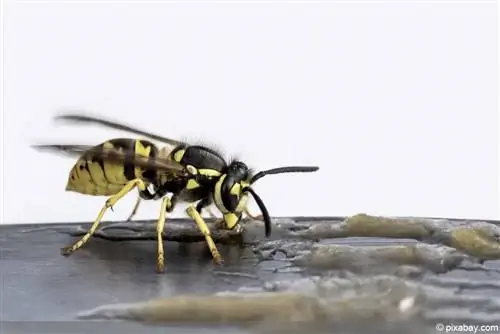
The experts call them traditional plants because the flowers of numerous perennials, trees and flowers carry nectar and pollen in abundance. By planting the following plants in the back of your garden, wasps, bees and bumblebees won't even come close to the house with the set table:
- Buddleia (Buddleja)
- Weigelia (Weigelia florida)
- Hollow Larkspur (Corydalis cava)
- Beardflower (Caryopteris)
- White Deadnettle (Lamium album)
- Lupine (Lupinus)
Conversely, wasp-repellent plants should be planted near the house. These primarily include intensely scented herbs, such as basil and sage. As can be seen from reports from home gardeners plagued by wasps, the insects avoid beds with tomato plants, garlic and horseradish.
Collect fruit mummies and fallen fruit
Overripe, rotting fruit magically attracts wasps. To prevent pests from accessing this food source in the garden, please harvest your apples, plums and cherries in good time. In addition, do not leave fruit mummies hanging in the crowns if you want to be spared from hungry wasps. Collect fallen fruit as soon as possible, because the hungry workers like to meet here for a banquet. Please wear sturdy gloves, because the insects sometimes crawl deep into the fruit and react in a bad mood to any disturbance.
Fighting aphids
Aphids excrete sweet honeydew as a byproduct. It's not just ants who are after this. Wasps also like to get a sip of the sugary temptation. By consistently fighting aphids with the classic soft soap solution, you will at least eliminate this reason that attracts wasps to your garden.
Tip:
Abandoned wasp nests are completely removed in winter so that next year young wasp queens do not declare the garden a kingdom again. As a rule, an empty nest does not become a home for a colony of wasps again. Nevertheless, young queens can smell where their predecessors already held court and found their own state in the immediate vicinity.
Conclusion
With these 5 home remedies you can make your summer table in the garden a taboo zone for hungry wasps without harming the beneficial insects. Sweet distractions promise the best prospects. By setting your own table at a sufficient distance from the insects, you and your guests can enjoy the food and drinks in peace. If lemon slices studded with cloves lie on the table, smoldering coffee beans exude their aroma or the scent of incense spreads throughout the garden, the buzzing nuisances turn away in disgust. With Citronella scented candles, you have a good chance of being spared from wasps and mosquitoes alike. In order to achieve maximum success in repelling wasps, the recommended home remedies are combined with each other.

